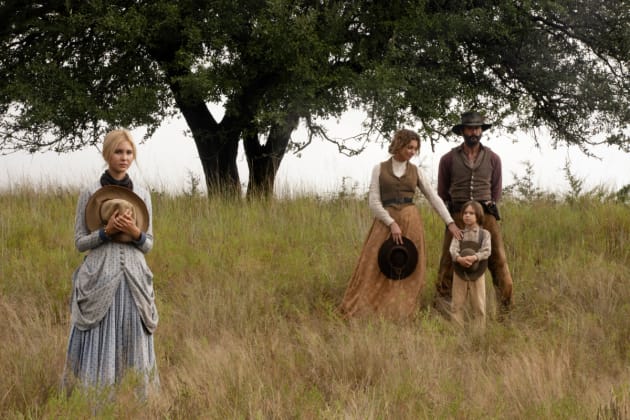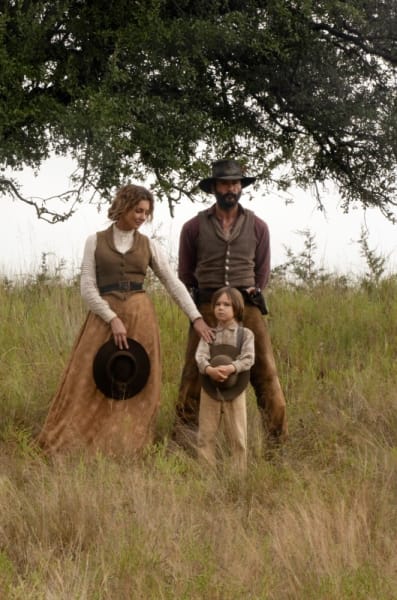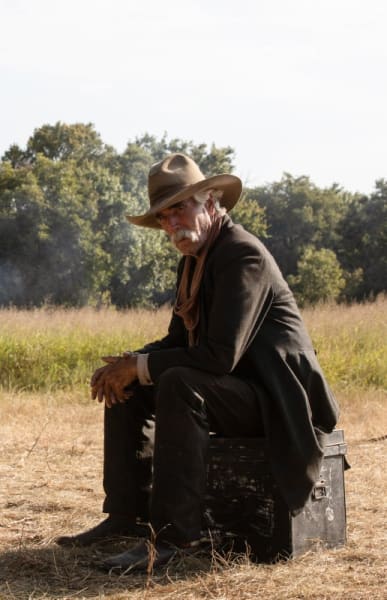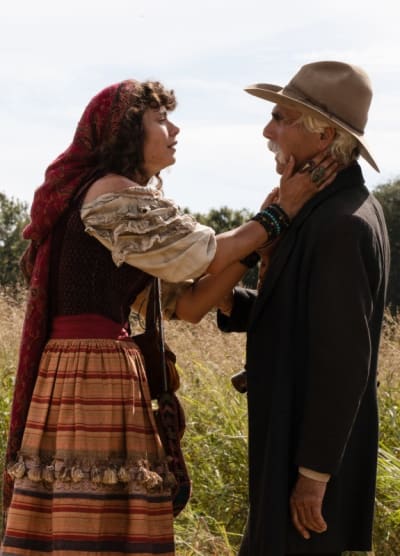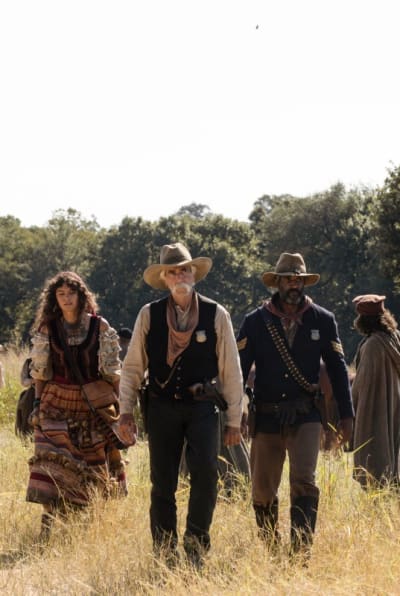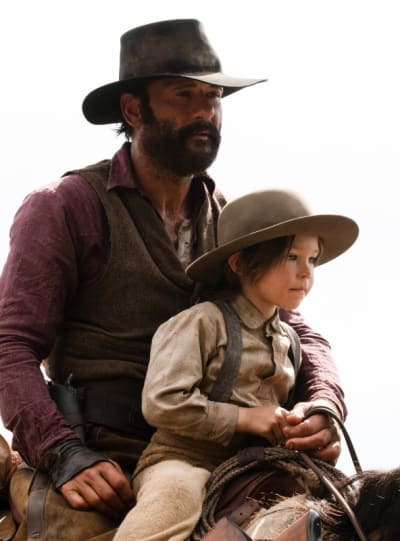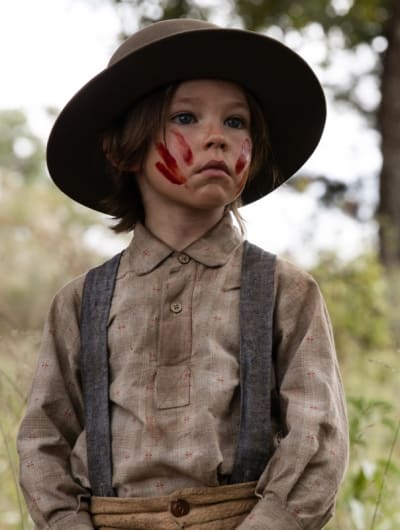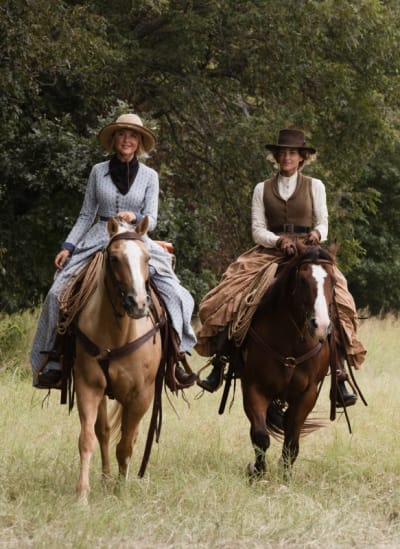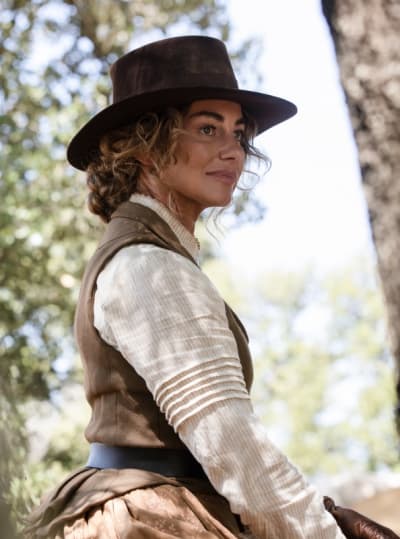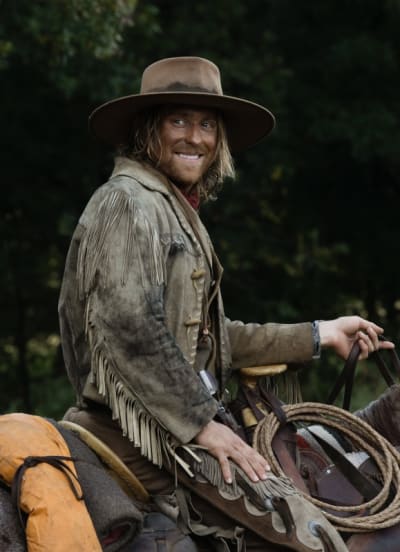Watching 1883 Season 1 Episode 3, it’s a wonder how we ever managed to tame this wild land.
Death and despair are the norms for the travelers, whether getting run over by a wagon, struck by a snake, or killed by bandits.
Elsa is still having an adventure filled with revelations and romance. But that won’t last forever.
The more violent and cursed their trip becomes, the more James withdraws from the wagon train.
Elsa has noticed it, but she hasn’t equated it with her father trying to protect them from what he experienced during the war. Whether death is personal to you or not, the more you experience it, the harder it becomes not to be affected.
That affectation is different for everyone. Like James, Shea and Thomas saw their fair share of death during the war, and after seeing 5000 men go down in one day, taking another life is relatively meaningless.
James is trying to spare his family that same fate, but it won’t be easy given the suffering that will come during their trip northwest.
Thankfully, none of the men have lost their compassion for those who need it the most.
James talks a good game about only caring for his family, but he’s a better man than that. He’ll protect them first but do his best for the others, as well.
Shea and Thomas have a job to do, including keeping those in the wagon train safe. A traveler named Noemi lost her husband, putting her in a very precarious position.
Noemi has no skills, and when Shea and Thomas approached her, her initial thought was to offer herself to Shea as a wife.
It’s unlikely that Shea will ever take another wife, but his heart nonetheless goes out to Noemi and her children. Between him and Thomas, they provided her with the knowledge and protection she’ll need to survive the journey.
Shea was also struggling with leadership. James being along for the ride is very helpful with his wealth of survival skills, but Shea worried that by not obeying his orders, the others would think less of Shea’s leadership.
Thomas: Ain’t much of a team player.
Shea: Yeah, but he’s capable.
Thomas: Don’t like him questionin’ us.
Shea: Not much we can do about it. He ain’t on the payroll.
Thomas: Yeah. When there’s two leaders, there ain’t no leader. Know what I mean? Need to figure that out.
The two men who took from Noemi what her dead husband took from them are just the type who would take advantage of a situation between James and Shea.
At first, Shea crippled their ability to travel with the group and promised death should he ever see them again, but when they rose up again, Shea allowed them one chance to make a liar out of him.
Shea’s assessment that they’d get men more capable to attack the wagon train seems highly likely, so why did Shea allow them to walk?
If you steal, you will stay where you stole.
Shea
It seems like a decision he’ll come to regret, but there are so many dangers lurking along the trail for them to discover, it probably won’t make much difference from which direction the threat comes.
If Shea doesn’t get bothered by necessary violence, James tries to keep his children from experiencing the same and uses a hunting trip to teach John about life and death.
John learned that lesson a lot earlier than Tate did with Kayce on Yellowstone, but it’s a familiar scenario thanks to what Kayce and Tate shared with Tate’s first kill and blooding.
It was a nice callback to the Duttons we’ve known for seasons and shows how family traditions have carried through the generations.
James: We took a life to give us life, so now we say think you.
John: To who?
James: The deer.
John: But the deer’s dead. He can’t hear us.
James: We say it anyway.
John: How do we say thank you?
James: We just say it.
John: Thank you.
James: When you kill a thing, son, it makes you less man, but more animal. We try to find the balance between ’em. That’s all life is. You understand?
Little John Dutton is just the cutest darned thing. His round face and big eyes suggest vulnerability, but his actions didn’t follow suit during the kill.
He’s also very inquisitive. His line of questioning about the horse making noise and how it differs from humans invading a hunting ground made good sense, and he needed more instruction to understand why you thank an animal that you just killed for giving its life.
Showing the importance of life in the face of so much death is a valuable lesson, and I appreciate how it’s done on 1883 so far.
James also told Margaret that he would build her a house that she could get lost in, and it made me wonder if he built the lodge. Scenes from Yellowstone that reference 1883 showed them in a much smaller home and James possibly dropping dead on the floor of that small house.
Maybe his promise indicates that he was down but not dead at that portion of the story.
Thomas seemed somewhat concerned that he and Shea might be guiding the wagon train for different reasons, but when they got a moment to themselves, Shea revealed his initial hesitance at the earlier conversation about ensuring a brighter future by protecting the children.
Shea: My daughter’s one of those kids could’ve made the world better.
Thomas: Yes, she was.
Shea: I’m doin’ this for the same reasons, Thomas.
We still know relatively little about Thomas and Margaret, but through Elsa, we got a little more background on Margaret when the two women helped protect the herd with Wade and Ennis.
Like most children, Elsa had failed to consider her mother’s life before she was a part of it.
I watched her ride, and I didn’t see my mother. I saw a woman; and the woman was magnificent.
Elsa
Elsa enjoyed her liberty riding with the cowboys, and as she did it, you could see a glint in her eye that she felt superior to other women for what she was experiencing. It looked like she felt sorry that her mother didn’t share that passion with her and her father.
But then Elsa got to see her mother in action, and her respect and understanding of Margaret were altered forever.
Margaret had mentioned before that she was concerned about taking the children to somewhere untouched by civilization. Would it hurt their education or romantic prospects?
Mentioning the lack of gentlemen where they were headed prompted James to wonder if she would have done things differently and married a gentleman herself if given the opportunity. Of course not.
Ennis: My gosh; you’re forward.
Elsa: Look who’s blushin’ now.
Ennis: You sayin’ I made you blush?
And just like that, from their hesitation about Elsa courting on 1883 Season 1 Episode 1, they have learned enough about Ennis to give him their blessing to court Elsa.
Ennis: You have terrible taste in men.
Elsa: [chuckles] You ain’t a man. You’re just a boy.
Ennis: I’m man enough.
Elsa: Jut a boy. Guess I have terrible taste in boys, too. [laughs] This flirtin’ thing is fun!
Ennis: So, she was! She was flirtin’! Kinda mean the way she does it, but she was flirtin’! Woo hoo!
That Elsa’s voiceover at the end came on the heels of John’s chat with Ennis suggests that the dangerous world colliding with her adventure might come at Ennis’s expense. I sure hope not.
James: You wanna court my daughter, you can.
Ennis: Court her?
James: You can do it.
Ennis: Not sure what it means.
James: Well, son. It means you can talk. Talk, and go on rides. Talk.
Ennis: We kinda been doin’ that.
James: You know the drill, then. You break her heart or get handsy, you and me gonna have a problem.
Ennis: Define handsy. [James eyes him]. Joke. Bad time to tell it. Sorry. Sorry.
James: Damn, boy.
They’re a source of light against so much darkness, and it’s hard to imagine how dramatically Elsa’s adventure would be affected if the cruel fate she was up against meant she’d lose the first fellow she ever flirted with too soon.
Although 1883 is considered a prequel to Yellowstone, it’s got a voice much different from its predecessor.
Taylor Sheridan has managed to make a full-on western with only the vaguest callouts to what came before, but it’s perfectly in line with how incredibly things have changed for our country in such a short time.
While watching 1883, it’s almost hard to believe how much we’ve accomplished as a nation. This show starts 100 years before I graduated from high school, and in that time, we went from wide open, untouched expanses of land filled with natural wonders and grave dangers to cities and roads from the Atlantic to the Pacific.
It’s rather awe-inspiring, and hopefully, continuing this journey only adds to the discussion of how far we’ve progressed and at what cost.
Carissa Pavlica is the managing editor and a staff writer and critic for TV Fanatic. She’s a member of the Critic’s Choice Association, enjoys mentoring writers, conversing with cats, and passionately discussing the nuances of television and film with anyone who will listen. Follow her on Twitter and email her here at TV Fanatic.
